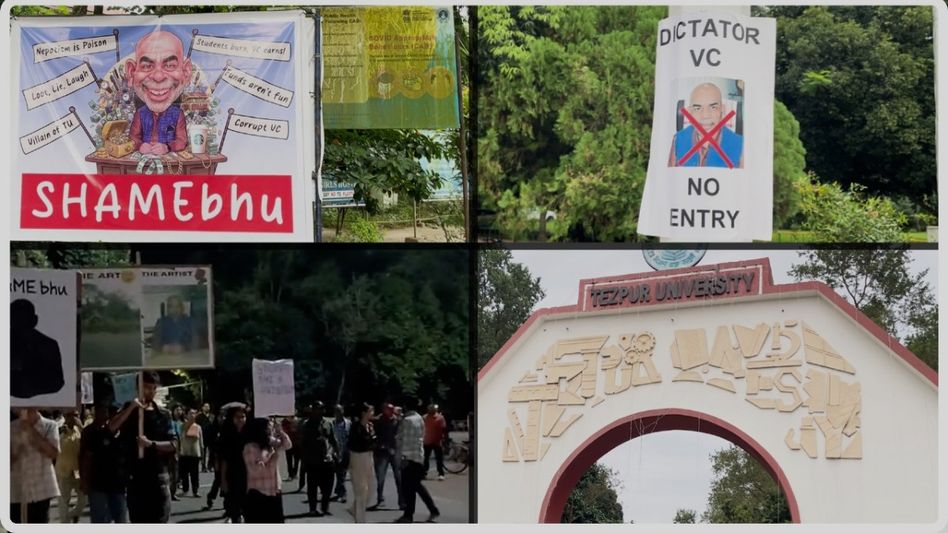How Assam’s premier university turned into a ground zero for dissent
Tezpur University faces widespread protests over governance and financial irregularities after Zubeen Garg's death. The university community demands an independent probe and removal of the Vice-Chancellor to restore trust.

Tezpur University, established on January 21, 1994, under an Act of Parliament as part of the Assam Accord—now finds itself at the centre of a growing storm. Founded alongside Assam University and IIT Guwahati to expand higher education in the region, the institution began in a modest rented building before shifting to its verdant 262-acre campus in 1997.
Today, those same green avenues echo with discontent. What began as subdued classroom whispers has transformed into a collective uprising. Teachers, staff, and students—once bound by the rhythm of academia—now march together under a single, charged slogan: “Remove the Vice-Chancellor.”
The man at the centre of this unprecedented campus revolt is Professor Shambhu Nath Singh, who is now accused of leaving behind a trail of unanswered questions, broken trust, and financial opacity. The Tezpur University Teachers’ Association (TUTA), backed by non-teaching employees and the student fraternity, says the university is in the throes of “a governance and moral collapse.”
The spark: Zubeen Garg, silence, and contempt
The unrest began in September 20, when the campus failed to properly honour the late Assamese cultural icon Zubeen Garg, who passed away on September 19. The Government of Assam had declared a mourning period across the state. Yet, university elections went ahead. When students protested, the Vice-Chancellor addressed them through a video call—his remark, “don’t make things funny,” ignited outrage.
What followed was a flood of accusations: neglect of campus morale, misuse of funds, and a shocking record of absenteeism. Professor Singh, according to TUTA, has been off-campus for 388 days between April 2023 and September 2025. The Vice-Chancellor last appeared on September 22 and, as of late October, remained untraceable.
“He is the head of an institution that has lost its head,” a senior faculty member said on condition of anonymity. “And what’s worse is that he seems unbothered.”
Books, budgets, and broken ethics
At the heart of the crisis lies a Rs 6.5 crore fund under the University Grants Commission’s Capital Assets scheme. According to TUTA, Rs 4.5 crore of that was spent on books and e-resources, largely through four Delhi-based vendors. Teachers allege the selection process was opaque, in violation of the General Financial Rules (GFR) 2017.
Auditors and fact-finding teams from the university’s own faculty found glaring discrepancies. Some e-books lacked publication details or ISBNs. Others, astonishingly, were freely available online. And despite being a university rooted in Assam’s cultural heartland, not a single Assamese book was procured in two consecutive fiscal years.
“This neglect of the Assamese language is symbolic of how detached the administration has become,” a TUTA statement noted. “In a university established to serve Assam, not buying a single Assamese book is not a bureaucratic slip, it’s a rejection of identity.”
A campus in revolt
Students joined the protests soon after. Their slogans now ring daily through the corridors of the university library and hostels: “Accountability! Transparency! Respect for Assam!” They accuse the administration of mental health neglect, draconian curfews, mass surveillance, and a Students’ Council crippled by top-down controls.
On October 29, teachers, staff, and students dressed in black attire and masks in a unified demonstration. The movement now has a rhythm, disciplined, persistent, and determined, while continuing normal classes.
Formal memorandums have been sent to the Governor of Assam (the university’s visitor) and the Chief Minister. The state government has ordered a magisterial inquiry into the allegations, though faculty members insist that only an independent probe by the Ministry of Education can restore confidence.
A pattern of centralised decay
Insiders describe a university that has grown increasingly centralised. Department heads complain that even academic book lists were finalized based on what certain Delhi vendors could supply, not what teachers recommended. Over two years, roughly Rs 6 crore in purchases flowed to four vendors with alleged links to earlier controversies at Bodoland University.
“The decisions have become concentrated in the VC’s office,” one faculty member said. “It’s as though Tezpur’s departments no longer matter. Autonomy has evaporated.”
This administrative model, critics argue, has corroded the very foundation of a university once known for its inclusive growth and academic innovation.
Leaking roofs, poor infrastructure, shoddy construction of hostels
Growing discontent has emerged among students over the alleged poor quality of hostel infrastructure on campus, with many accusing the Vice-Chancellor of showing complete indifference to their grievances.
According to the teachers speaking on behalf of the students, the newly constructed hostels suffer from substandard workmanship, with leaking roofs, poorly built toilets, and inadequately designed kitchens. The deteriorating condition of the facilities has reportedly made daily life difficult for residents, who complain of sleepless nights due to the lack of basic comfort and habitable conditions.
Several students have expressed frustration that their repeated appeals for attention to these issues have gone unanswered, alleging that the administration’s negligence reflects a broader failure in governance.
Missing leadership, growing despair
As the Vice-Chancellor remains conspicuously absent, Tezpur University seems caught in a vacuum. Classrooms continue, but without direction. Administrative files stack up, unsigned. Faculty appointments languish; 41 guest lecturers’ contracts were not renewed. Vacant posts pile up. Even the Finance Officer, some allege, has ‘restricted access’ to records without top authorization.
Outside the main gate, banners flutter in the winds of frustration: “Save Tezpur University,” “Justice for Zubeen,” and “We are not afraid.” The symbolism is clear institutions are not merely about budgets or rankings, but about belonging, responsibility, and human leadership.
The language left out
In Assam, language is identity. The revelation that no Assamese titles were procured in two years shook academic and cultural circles alike. For scholars, the omission is both academic negligence and cultural alienation.
“What kind of university in Assam turns its back on Assamese literature?” asked a senior Assamese studies professor. “It’s not just about procurement, it’s about principle.”
A call for redemption
TUTA’s statement calls for an independent, transparent investigation and the immediate removal of the Vice-Chancellor. For now, Tezpur University waits, its classrooms quieter, its teachers angrier, its students determined. A campus once known for peace now demands nothing less than accountability.
Copyright©2025 Living Media India Limited. For reprint rights: Syndications Today









